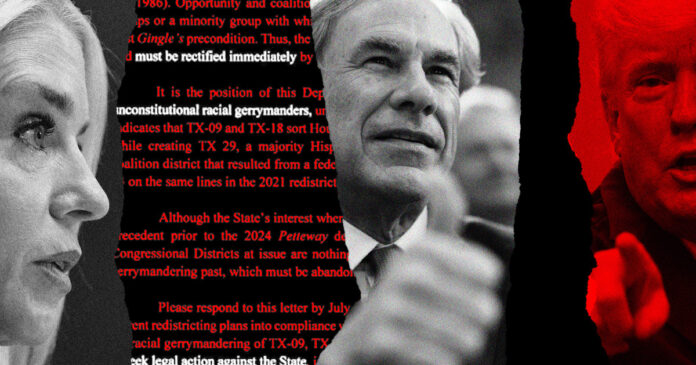"Unmasking Power: How Legal Maneuvers Shape Texas Politics Under Trump"
Texas Redistricting: A Legal Tug-of-War Amid Political Maneuvering
By ProPublica and The Texas Tribune
In a significant political maneuver, Texas Governor Greg Abbott and Attorney General Ken Paxton are poised to redraw congressional district lines, a move that has sparked controversy and legal challenges. This decision follows a stern warning from the U.S. Department of Justice (DOJ) regarding the constitutionality of Texas’ existing congressional map, which the DOJ labeled as “unconstitutional racial gerrymanders.” The implications of this redistricting effort extend beyond Texas, reflecting a broader strategy employed by the Trump administration to influence political outcomes through legal channels.
Background: The DOJ’s Warning
On July 7, 2025, the DOJ issued a letter to Abbott, demanding immediate action to amend the congressional map. The letter asserted that the map, passed by the Republican-led Texas Legislature, disproportionately favored white voters while diluting the voting power of Black and Latino communities. The DOJ threatened legal action if the state failed to comply, effectively giving Abbott and Paxton the political cover to expedite a redistricting process that could secure additional congressional seats for Republicans ahead of the 2026 midterm elections.
Legislative Priorities and Political Calculations
During a special legislative session, Texas lawmakers prioritized the redistricting bill over other pressing issues, including disaster relief for victims of severe flooding that claimed over 130 lives. The new congressional boundaries are designed to potentially net Republicans up to five additional seats, a strategic advantage that has drawn immediate legal challenges from a coalition of Black and Latino voters. These groups argue that the new map discriminates against nonwhite voters, echoing concerns raised by the DOJ.
Abbott has publicly committed to signing the new map into law, stating, “The One Big Beautiful Map has passed the Senate and is on its way to my desk, where it will be swiftly signed into law.” This statement underscores the urgency and political significance of the redistricting effort.
A Broader Strategy: Legal Maneuvering
The redistricting controversy is part of a larger trend observed this summer, where the Trump administration has utilized legal threats to compel Republican governors and state officials to align with its political agenda. Legal experts note that this approach is more aggressive than previous “sue and settle” tactics employed during the Obama administration, which often involved collaboration with liberal advocacy groups.
In Texas, the Trump administration has collaborated with state leaders to achieve desired outcomes through legal channels. For instance, the DOJ recently filed a lawsuit that effectively nullified the Texas Dream Act, which allowed undocumented students to access in-state tuition at public colleges. This move came shortly after efforts to repeal the law failed in the state Legislature, highlighting a strategic bypass of the legislative process.
Implications for Governance and Legal Norms
Critics of the Trump administration’s tactics argue that this approach undermines the integrity of the judicial system and the checks and balances established by the U.S. Constitution. Legal scholars express concern that the administration’s strategy to circumvent legislative processes poses a threat to democratic governance. University of Texas law professor Sanford Levinson warns that such maneuvers reflect an authoritarian mindset, prioritizing loyalty to the administration over adherence to constitutional norms.
Jim Harrington, the retired founder of the Texas Civil Rights Project, emphasizes that the administration’s tactics risk eroding the judiciary’s role as an independent branch of government. He argues that the use of collusive lawsuits and the selection of sympathetic judges allow the administration to evade constitutional constraints.
Race-Based Debates and Future Legal Challenges
The redistricting map’s legality will likely be contested in court, with decisions hinging on how judges interpret the DOJ’s assertion that the previous map was overly attentive to race. Critics argue that the new map, which aims to dismantle minority-coalition districts, perpetuates racial discrimination by favoring white voters.
Michael Li, senior counsel for the Democracy Program at the Brennan Center for Justice, contends that both the existing and proposed maps discriminate against nonwhite voters. He points to demographic shifts in Texas, where Hispanic, Black, and Asian American communities accounted for 95% of the state’s population growth, yet the new map maintains a majority of white districts.
Conclusion
As Texas navigates this contentious redistricting process, the implications extend far beyond state lines. The collaboration between state leaders and the Trump administration raises critical questions about the future of governance, legal integrity, and the protection of voting rights. With legal challenges on the horizon, the outcome of this redistricting battle will likely shape the political landscape in Texas and beyond for years to come.
For ongoing coverage of this issue, stay tuned to ProPublica and The Texas Tribune.
